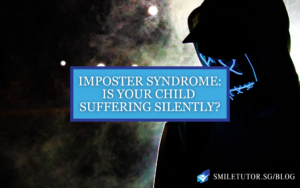
As you’re walking home with your child, they look up and say to you:
“Mummy, I’m sorry I did poorly again.”
While you were expecting bad grades, you’re instead handed a test paper with near-perfect results. “I should have gotten full marks.” They explain.
“Timmy, that’s okay!” You chuckle with relief.
“This is still a really good score! I’m so proud of you.” You give your child a big hug, happy that he’s already so eager to score better.
Timmy nods silently with a strained smile, and returns to his room. Behind closed doors, Little Timmy is on his desk, staring intently at his notes.
Your words stay on his mind, but the encouragement only makes him feel worse. To shake off that feeling, Timmy continues to study in spite of his exhaustion.
He’s not trying hard to better himself; Timmy is motivated by fear.
What is Imposter Syndrome?

[Unsplash]
What is Timmy so afraid of? Expectations.
Expectations are weighing him down so much, it almost feels like he’s going crazy. Many of us may have not heard about this condition, but Imposter Syndrome is most definitely real and still affects many people in society today!
As a parent, you must have concerns. What are the causes? What are the symptoms? How can I keep my child safe from such thoughts? Let’s start by learning what it is, what really is Imposter Syndrome?
Short answer— “Imposter Syndrome” is an emotional instability.
Why? Because the Imposter feels like they’re not up to everyone’s standards.
Everyone has moments when they feel insecure about themselves, but for Imposters, this feeling can last through their entire lives.
An “Unofficial” Mental Disorder
Psychologists in 1978 coined the term “Imposter Syndrome” to highlight the feelings of “fraud”, or an “Imposter” that these individuals feel.
While not recognized by the International Classification of Diseases (ICD) or Diagnostic and Statistical Manual of Mental Disorders (DSM), the symptoms shown from Imposter Syndrome are associated with that of depression.
The Imposter experiences self-depreciative thoughts like a form of paranoia, creating unhealthy headspaces that stay with them even after they’ve grown up.
How Does It Develop In Children?

[Pexels]
Imposter Syndrome is not developed from birth. It is said that Imposters are created by their environments when they’re younger and impressionable. These are the culprits to watch out for!
1) Early experiences: Negative experiences in childhood such as criticism, bullying, or not feeling validated can lead to the belief that one is not good enough.
A child’s self-esteem is easily molded by their surroundings, and they may pick up negative memories as “truths” about themselves.
Be careful of what you say or do around your children!
2) Perfectionism: People who strive for perfection often set excessively high standards for themselves, and when they fail to meet their own expectations, they feel like a fraud.
Children manifest a sense of perfectionism from continued praise, and may seek for more unrealistic heights to receive that recognition again.
Ironically, overpraising children has been known as a cause of damage to their self-esteem.
3) Comparison: Constantly comparing oneself to others’ achievements can lead to feeling inadequate and unworthy of one’s own successes.
When you talk about relatives’ children, an unnecessary rivalry may be created. The expectations and shame that follows when they are unable to meet them, can hurt a child’s self-esteem easily.
4) Lack of recognition: When achievements are not acknowledged or celebrated by others, the achiever can begin to grow doubts on the authenticity of their accomplishments.
This can be commonly picked up by children in households where parents seldom find time to accompany their child or accommodate any time for them.
5) Overgeneralization: One can develop imposter syndrome by overgeneralizing failures as evidence that they’re not competent, even if their successes outweigh their mistakes.
A strict childhood can often be the cause, where they’re constantly “required to work harder” instead of getting praised.
How to Identify and Help an “Imposter” Child

As you know, prevention is the best cure. What good is trying to stop it when your child has already changed for the worse? When it’s past a certain stage, deteriorated mental health can be difficult and painful to treat.
If we want to be better safe than sorry, why not start being proactive in looking out for some of these possible early symptoms? To start you off, here are the known early symptoms that can attribute to a child becoming an “imposter”:
1) Inhibited performance: Is your child showing less interest to engage in challenging tasks or activities?
You should raise concern over this and talk over it with your child.
2) Anxiety and Depression: The constant self-doubt and fear of failure pushes the mental boundaries of a child, often leading to more serious illnesses of the mind.
If the issue persists, it may be wise to consult a professional or a psychiatrist so that your child can recover with proper steps.
3) Difficulty forming relationships: Children may lose their self-worth and have a falsely negative image of themselves, lowering their self-esteem to communicate well in social situations.
When this happens, you may want to break them out of a bad headspace.
There are several facilities in Singapore that let children participate in hands-on activities. Camps, public speaking courses, or even recreational activities— these endeavors will help them regain their own voice and to build their self-confidence.
We all know that children wear their emotions on their faces. When children’s mental states change, it’s possible for us to catch early signs of trouble.
But make no mistake! Children can also hide their insecurities when they find it uncomfortable to ask for help. It is important for us as parents to be approachable, communicative and proactive, so that our children can grow up safely in a conducive environment.
Can Imposter Syndrome be Cured?

[Pexels]
What if the worst has come to pass. You’ve read this article, and realised that your child has checked most of the points that we’ve mentioned.
If the condition truly persists no matter how much care and attention you’re giving them, don’t lose hope! The good news is that imposter syndrome is not truly permanent, and measures can be taken when symptoms have been recognized.
We have to stress that it will NOT be easy to treat someone suffering from Imposter Syndrome, but your child can still find their way back with the help of a supportive family.
We have already talked about ways to identify and de-escalate the symptoms. But in the long-term, let’s take these 4Rs into consideration for a complete recovery!
1) Recognize – The first step in recovering from imposter syndrome is to recognize symptoms. As we’ve talked about it earlier, this includes them feeling like a fraud, doubting their own abilities, and fearing exposure. Once these feelings are identified, you can start addressing them in the next step.
2) Remind – Instead of focusing on what they do not know or are not good at, change their mindsets to focus on their current strengths and accomplishments. Have them write down their achievements, skills, and experiences, and remind themselves regularly. A diary or simply talking to someone they trust can help!
3) Reframe – Failure is a natural part of learning and growth. Instead of fearing failure, have them see it as an opportunity to learn and improve. Reframe the negative concept of failure in their minds, and do not let them equate failure with their value as a person or professional.
4) Relate – Many people experience Imposter Syndrome, and it can be helpful to connect with others who have gone through similar experiences. You can seek out a mentor, colleague, or therapist who can offer your child important support and guidance.
Conclusion

[Pexels]
Recovering from imposter syndrome takes time, effort, patience, and self-compassion, but it is possible. Your child must learn to always be kind to themselves, and focus on their own strengths and accomplishments if they want to break out of the illusion of failure.
A positive, healthy mindset cannot be shaped overnight. While preventive, it is also a lifestyle that requires patience, persistence, and a whole lot of self-love.
It’s equally vital to surround them with positive people who not only love them for their personalities, but also believe in their abilities to succeed.
Seek out mentors who can provide them with that guidance and support, and give them plenty of reassurance so that they won’t be afraid to ask for help when they need it the most. So have them continue to keep at their goals, and take it one step at a time. Continue to build momentum and never give up on their journey towards a more positive life.
To read more about this topic, check out a few of our related articles below.
READ NEXT:
How To Prevent Youths From Spiraling Into Mental Illnesses
How Should Parents/Teachers Deal With The Mental Health of Children
